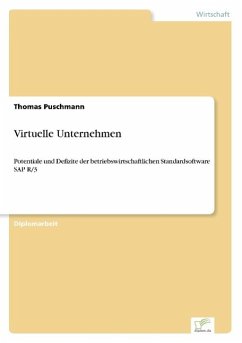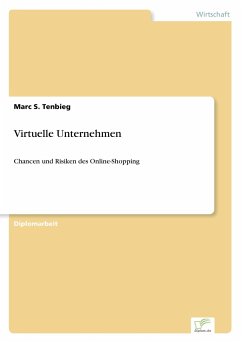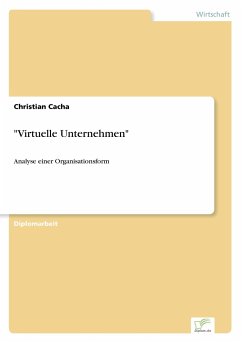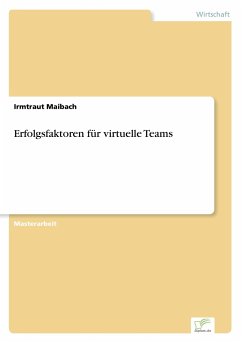
Virtuelle Unternehmen
Potentiale und Defizite der betriebswirtschaftlichen Standardsoftware SAP R/3
Versandkostenfrei!
Versandfertig in 1-2 Wochen
38,00 €
inkl. MwSt.

PAYBACK Punkte
0 °P sammeln!
Diplomarbeit aus dem Jahr 1999 im Fachbereich BWL - Personal und Organisation, Note: 1,6, Universität Konstanz (Politik- und Verwaltungswissenschaft), Sprache: Deutsch, Abstract: Inhaltsangabe:Einleitung:Den Implikationen von Informations- und Kommunikationstechnologien auf die Organisation von Unternehmen gilt seit jeher die Aufmerksamkeit von Wissenschaft und Praxis. Einerseits erfordert die wachsende Komplexität des Unternehmensumfeldes kooperative Konzepte der Leistungserstellung zur Erhaltung der Wettbewerbsfähigkeit, andererseits senken Informations- und Kommunikationstechnologien die...
Diplomarbeit aus dem Jahr 1999 im Fachbereich BWL - Personal und Organisation, Note: 1,6, Universität Konstanz (Politik- und Verwaltungswissenschaft), Sprache: Deutsch, Abstract: Inhaltsangabe:Einleitung:
Den Implikationen von Informations- und Kommunikationstechnologien auf die Organisation von Unternehmen gilt seit jeher die Aufmerksamkeit von Wissenschaft und Praxis. Einerseits erfordert die wachsende Komplexität des Unternehmensumfeldes kooperative Konzepte der Leistungserstellung zur Erhaltung der Wettbewerbsfähigkeit, andererseits senken Informations- und Kommunikationstechnologien die Transaktionskosten für deren Entstehung. Virtuelle Unternehmen bilden im Rahmen dieser Entwicklung das derzeitige Endmodell auf der Suche nach organisatorischer Flexibilität.
Virtuelle Arrangements erfordern kooperative Informationssysteme. Solche Systeme sind dann kooperativ, wenn sie eine gemeinsame Informationsverarbeitung aller Partner ermöglichen, indem sie diese sowohl horizontal als auch vertikal zu integrieren vermögen. Neueste technologische Entwicklungen auf der Basis von Komponententechnologien, die eine Interoperabilität durch offene Kommunikations- und Schnittstellenstandards wie dem Internet und CORBA gewährleisten, schaffen hierfür die Voraussetzung und werden deshalb eingehend analysiert. Neben der Inhärenz dieser technischen Gesichtspunkte müssen Informationssysteme in Virtuellen Unternehmen über betriebswirtschaftliche Funktionen zur Integration dislozierter Wertschöpfungsketten verfügen. Für die Gewährleistung dessen werden hierfür Systeme in den Bereichen Enterprise Resource Planning, Workflow Management, Electronic Commerce und Supply Chain Management diskutiert.
Die betriebswirtschaftliche Standardsoftware SAP R/3 bietet neben der technischen Ebene mit einer Komponentenarchitektur und offenen Schnittstellen, die genannten betriebswirtschaftlichen Funktionen im Bereich der Logistik, eine Workflow-Anwendung, Electronic Commerce Applikationen und ein Supply Chain Management-System. Eine detaillierte Analyse der einzelnen Komponenten soll deshalb Aufschluß darüber geben, ob deren Integrationsfähigkeit die Komplexität virtueller Unternehmensstrukuren zu absorbieren vermag.
Abstract:
The implications of information and communication technology on the organization of enterprises always influenced the attention of research and practice. On one hand the increased complexity of the enterprise-environment requires concepts for co-operation, in order to face competition. On the other hand information and communication technology lowers the transaction costs for their constitution. Currently Virtual Enterprises are the endmodel searching for organizational flexibility.
Virtual arrangements need co-operative information systems. Such systems are cooperative when they allow common information processing between all partners, by integrating them in horizontal and vertical direction. For this, modern technological innovations based on Componentware, which enable interoperability through open communication- and interface-standards like the Internet and CORBA, build the primariliy basis and shall therefore be analyzed in detail. Besides the inherence of this technical view, Information systems must contain business functions for the integration of decentralized value chains. Therefore Enterprise Resource Planning, Workflow Management, Electronic Commerce and Supply Chain Management-Systems are discussed.
The standard business software SAP R/3 includes, besides the technical dimension with its component architecture and open interfaces, the mentioned business functions in logistics, a Workflow-software, Electronic Commerce applications and an Supply Chain Management-system. Therewith a detailed analysis of this components shall provide transparency whether their integration-feasibility is suited for absorbing the complexity of virtual enterprise s...
Den Implikationen von Informations- und Kommunikationstechnologien auf die Organisation von Unternehmen gilt seit jeher die Aufmerksamkeit von Wissenschaft und Praxis. Einerseits erfordert die wachsende Komplexität des Unternehmensumfeldes kooperative Konzepte der Leistungserstellung zur Erhaltung der Wettbewerbsfähigkeit, andererseits senken Informations- und Kommunikationstechnologien die Transaktionskosten für deren Entstehung. Virtuelle Unternehmen bilden im Rahmen dieser Entwicklung das derzeitige Endmodell auf der Suche nach organisatorischer Flexibilität.
Virtuelle Arrangements erfordern kooperative Informationssysteme. Solche Systeme sind dann kooperativ, wenn sie eine gemeinsame Informationsverarbeitung aller Partner ermöglichen, indem sie diese sowohl horizontal als auch vertikal zu integrieren vermögen. Neueste technologische Entwicklungen auf der Basis von Komponententechnologien, die eine Interoperabilität durch offene Kommunikations- und Schnittstellenstandards wie dem Internet und CORBA gewährleisten, schaffen hierfür die Voraussetzung und werden deshalb eingehend analysiert. Neben der Inhärenz dieser technischen Gesichtspunkte müssen Informationssysteme in Virtuellen Unternehmen über betriebswirtschaftliche Funktionen zur Integration dislozierter Wertschöpfungsketten verfügen. Für die Gewährleistung dessen werden hierfür Systeme in den Bereichen Enterprise Resource Planning, Workflow Management, Electronic Commerce und Supply Chain Management diskutiert.
Die betriebswirtschaftliche Standardsoftware SAP R/3 bietet neben der technischen Ebene mit einer Komponentenarchitektur und offenen Schnittstellen, die genannten betriebswirtschaftlichen Funktionen im Bereich der Logistik, eine Workflow-Anwendung, Electronic Commerce Applikationen und ein Supply Chain Management-System. Eine detaillierte Analyse der einzelnen Komponenten soll deshalb Aufschluß darüber geben, ob deren Integrationsfähigkeit die Komplexität virtueller Unternehmensstrukuren zu absorbieren vermag.
Abstract:
The implications of information and communication technology on the organization of enterprises always influenced the attention of research and practice. On one hand the increased complexity of the enterprise-environment requires concepts for co-operation, in order to face competition. On the other hand information and communication technology lowers the transaction costs for their constitution. Currently Virtual Enterprises are the endmodel searching for organizational flexibility.
Virtual arrangements need co-operative information systems. Such systems are cooperative when they allow common information processing between all partners, by integrating them in horizontal and vertical direction. For this, modern technological innovations based on Componentware, which enable interoperability through open communication- and interface-standards like the Internet and CORBA, build the primariliy basis and shall therefore be analyzed in detail. Besides the inherence of this technical view, Information systems must contain business functions for the integration of decentralized value chains. Therefore Enterprise Resource Planning, Workflow Management, Electronic Commerce and Supply Chain Management-Systems are discussed.
The standard business software SAP R/3 includes, besides the technical dimension with its component architecture and open interfaces, the mentioned business functions in logistics, a Workflow-software, Electronic Commerce applications and an Supply Chain Management-system. Therewith a detailed analysis of this components shall provide transparency whether their integration-feasibility is suited for absorbing the complexity of virtual enterprise s...














